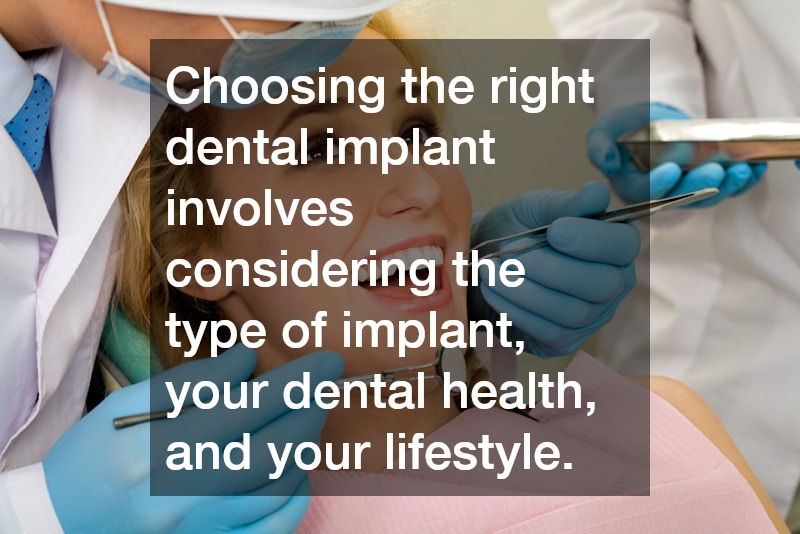What Are the Different Types of Dental Implants and Which Is Right for You?
This article explores the various types of dental implants available today. Whether you need a single tooth replacement or a full arch, we’ll break down the options and help you determine which one might be the best fit for you.
What Are the Main Types of Dental Implants?
Endosteal Implants
Endosteal implants are the most commonly used type of dental implants. They are surgically placed directly into the jawbone.
Typically made of titanium, they resemble small screws and serve as roots for artificial teeth.
This type of implant is ideal for patients with sufficient bone mass who are healthy overall. The recovery time varies, but improvements in implant surfaces have enhanced their success rate. Regular visits to your dental professional can help maintain the integrity of an endosteal implant.
Endosteal implants are usually recommended for patients seeking a sturdy and lasting tooth replacement solution. Proper oral hygiene, including regular flossing and brushing, is vital for their durability. Understanding all relevant procedures can aid in making an informed decision.
Subperiosteal Implants
Subperiosteal implants are an alternative for individuals with insufficient bone height or those unable to wear conventional dentures. Instead of being placed in the jawbone, these implants sit on top of the bone but under the gum tissue. A metal framework with posts is attached to the frame, and the gum heals around it, securing it in place.
This type of implant is becoming less common due to advancements in bone grafting. However, they can still be beneficial in specific cases where bone density is too low. Careful assessment of a patient’s oral health is crucial in determining if a subperiosteal implant is the right option.
Subperiosteal implants can be a viable choice for those who otherwise can’t support an endosteal implant. Keeping the framework clean and maintaining healthy gums is essential to ensuring the success of this implant. Consulting with a reputable dental expert can significantly help in weighing your options.
Zygomatic Implants
Zygomatic implants offer a solution for patients with severe bone loss in the upper jaw. Instead of being anchored in the jawbone, they are embedded in the zygomatic bone, or cheekbone, which offers dense and sturdy support. Due to the complexity of the procedure, they are considered highly specialized implants.
This type of implant can be an effective solution when other options are not viable due to significant bone deterioration. It’s important to be aware that this surgery is more invasive and requires careful planning. It often involves collaboration between oral surgeons and prosthodontists.
Although not commonly used, zygomatic implants can be life-changing for those who qualify for them. Regular follow-up and meticulous oral hygiene are crucial to the long-term success of zygomatic implants. Exploring all potential dental restoration methods with your dentist helps ensure the best choice is made.
What Factors Should I Consider When Choosing an Implant?
Bone Density and Health
The health and density of your jawbone are critical factors in determining the appropriate type of dental implant. Sufficient bone mass ensures that implants remain stable and secure. A dentist may recommend bone grafting to enhance your bone structure before proceeding with implantation.
Advanced imaging techniques, such as 3D scans, can provide essential information about your jawbone condition. Identifying potential challenges beforehand helps tailor a treatment plan to meet your unique needs. A comprehensive evaluation ensures your implants align with your health status.
Patients with higher bone density often experience fewer complications and improved implant integration. Adopting a diet rich in calcium and vitamin D can support healthy bone development. Regular dental check-ups play a pivotal role in monitoring bone health and implant success.
Cost and Insurance Options
The cost of dental implants can vary significantly based on the type of implant chosen and the complexity of the procedure. Many insurance plans now offer partial coverage for implants, but it’s crucial to understand your policy thoroughly. Consulting with both your dentist and insurance provider can unveil potential ways to lessen out-of-pocket expenses.
Financing options and payment plans are often available through dental offices. Prioritize understanding the complete financial commitment before commencing treatment. Shopping around for cost estimates can help you assess the best plan for your budget.
Though initially expensive, dental implants can prove economical in the long run due to their durability. Investing in quality implants reduces the need for frequent replacements. A clear understanding of related costs will guide you in making an informed financial decision.
Lifestyle and Maintenance
Your lifestyle and ability to maintain oral hygiene are essential considerations when selecting dental implants. Implants require regular maintenance, similar to natural teeth, to remain in optimal condition. Commitment to daily routines such as brushing and flossing directly impacts long-term success.
Certain lifestyle habits, like smoking, significantly increase the risk of implant failure. Being transparent with your dentist about your habits ensures they can provide the best guidance. Achieving a balance between treatment preferences and lifestyle compatibility enhances implant benefits.
Frequent dental check-ups aid in detecting potential issues early on. Collaborating with dental professionals and maintaining a proactive approach ensures healthier outcomes. Envisioning how implants integrate into your daily life assists in making the best choice for your situation.
Conclusion
Choosing the right dental implant involves several considerations, including the type of implant, your personal dental health, and your lifestyle needs. By understanding the differences and consulting with your dental professional, you can make an informed decision that will ensure both functionality and aesthetics. Achieving the right balance of cost, comfort, and care can result in a significantly enhanced quality of life.



